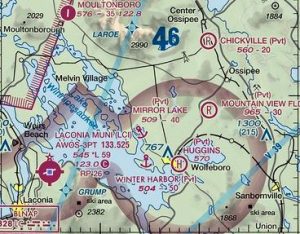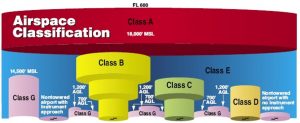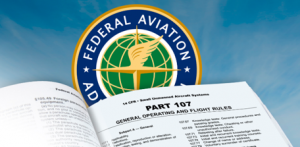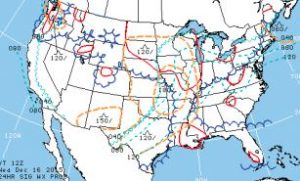Become an FAA Certified Drone Pilot to Fly for Commercial Use
This live in-person 7.5 hour ground school workshop, originally developed by Mark Donovan for the University of New Hampshire’s Drone Academy, helps prepare students to pass the FAA Part 107 Remote Pilot Aeronautical Knowledge test. More specifically, it provides in-depth training on the FAA’s Part 107 non-hobbyist small Unmanned Aircraft Systems (sUAS) rules and regulations, as well as all other knowledge areas of aviation required by the FAA, to become a certified Part 107 Remote Pilot and to operate a drone commercially in the United States National Airspace System.
Next workshop starts June 26th, 2023. Register below today!
There are many online Part 107 Test Prep courses you can choose from. However, they’re generally taught by watching a series of pre-packaged videos, with no live interaction with an instructor to immediately answer any questions you may have as you attempt to learn the material. At Laconia Flight Academy we help students prepare for the FAA’s Part 107 Remote Pilot Knowledge test a little differently.
Laconia Flight Academy’s Flight Instructor (CFII) Mark Donovan teaches the Part 107 Remote Pilot Test Prep course in person at the Laconia, New Hampshire Airport Terminal facility. This classroom environment enables students to interact directly with the instructor in a face-to-face setting maximizing their learning experience and familiarization with the FAA’s Part 107 Remote Pilot requirements.
By participating in a live classroom environment students can more quickly grasp the complicated subject matter areas required on the FAA’s Remote Pilot Knowledge test. Specifically, subject matters such as:
- Understanding the National Air Space System and all its Classifications
- Calculating Weight and Balance of a drone
- Interpreting aviation weather resources such as METARs and TAFs
- Reading Aviation Sectional Charts
By the end of the 7.5 hour course, students will have a much better understanding of the technical subject matters that they need to master for passing the FAA Remote Pilot Exam, than if they had studied independently watching hours upon hours of a video series of the same material.
Who Should Attend this Workshop?
This course is designed for hobbyist and industry drone pilots looking to fly drones for compensation, as well as for law enforcement and first responders required to fly drones as part of their professional line of work, and for any other drone pilot wanting to legally and safely fly drones in the United States National Airspace System. The course is in direct alignment with the FAA’s Part 107 remote pilot certification requirements and includes the latest in 2021 regulation changes.
This is a Live in-person course, where the instructor and students directly interact with each other during the classes.
Topics covered in detailed during the 107 Remote Pilot course include:
- Part 107 Remote Pilot Certification Requirements
- Part 107 Aeronautical Knowledge Test General Information
- Scheduling to take the Part 107 Remote Pilot Aeronautical Knowledge Exam
- Application Process for Obtaining a Part 107 Remote Pilot Certificate
- Applicable FAA Documents and Regulations Associated with sUAS
- New Part 107 Rules – Effective April 21, 2021
- Airspace classification, ops requirements and flight restrictions affecting sUAS ops
- Aviation weather sources
- Effects of weather on sUAS performance
- sUAS loading
- Emergency procedures
- Crew Resource Management
- Radio Communication Procedures
- Determining the Performance of sUAS
- Physiological effects on Pilot Performance
- Aeronautical Decision-Making and Judgment
- Airport Operations
- Night Operations
- Maintenance and Pre-flight Inspection Procedures
Practice test questions are introduced at the end of each course chapter.
Emphasis Topics covered in the Part 107 Remote Pilot Course Include:
|
How to Read Sectional Charts There’s a wealth of information on an FAA Sectional Chart that can ensure you fly your drone safely and avoid manned aircraft. This Part 107 remote pilot course provides detailed discussion on interpreting them. |
 |
|
National Airspace System Our nation’s airspace is comprised of controlled and uncontrolled airspace, as well as special use and “other” airspace. Knowing where you can legally fly a drone is important for a remote pilot. This course provides in-depth discussion on this topic. |
 |
| New 2021 Part 107 Rules
Many new Part 107 rules became effective April, 2021, including:
|
 |
| Aviation Weather
Up to 16% of the Remote Pilot Aeronautical Written Exam can be on weather. This course provides in-depth review on:
|
 |
By the end of this Part 107 Remote Pilot course students will be better prepared to successfully pass the FAA Remote Pilot Aeronautical Knowledge Test.
In addition to in-depth training on the Part 107 FAA rules and regulations, students will also be introduced to the various sUAS-related careers paths that become available to them after receiving their Part 107 Remote Pilot Certificate from the FAA.
Workshop Dates – This course is taught over two nights during a one week span, in two 4-hour sessions. The next workshop starts Monday, June 26th, 2023 (5:00pm to 9:00pm EDT), with the second half of the workshop to be held on June 28th at the same times. Custom dates are also an option!
Individual Course Cost – $195
To enroll in this course, simply call our office at (603) 528-6818 to register and pay for the workshop.
If you have further questions about this workshop, contact us here.
Lifetime Access – To maintain your FAA Part 107 Remote Pilot license, you’ll need to pass a recurrent FAA knowledge test every 24 months. Students of this course will receive lifetime access to the online training course material, which is updated regularly in response to FAA Part 107 rule changes.
Help When you Need it – If you have any questions after completing the workshop, simply call or email us, and we will respond back to you quickly.
Instructor Background – Mark Donovan
- UNH Adjunct Instructor who developed the course material and has taught the same FAA Part 107 Workshop since 2018
- Part 107 certified small Unmanned Aircraft Systems (sUAS) remote/drone pilot.
- Sky Bright and Laconia Flight Academy Part 61 Certified Flight Instructor, Commercial and Instrument rated manned aircraft pilot.
- Consultant to other online Part 107 Drone Schools
- Mission Pilot & Instructor/Check pilot for New Hampshire Wing Civil Air Patrol
- Falcon Imagery owner – sUAS company founded in 2016.
- 37+ years in high tech working in various Electrical Engineering and Technical Marketing positions.
